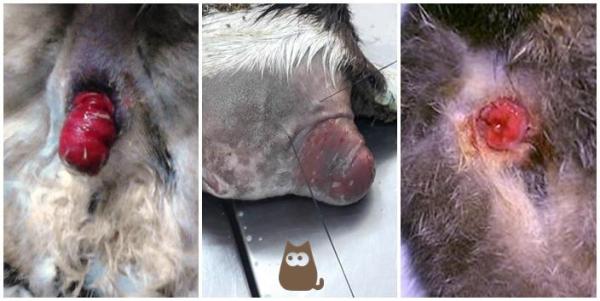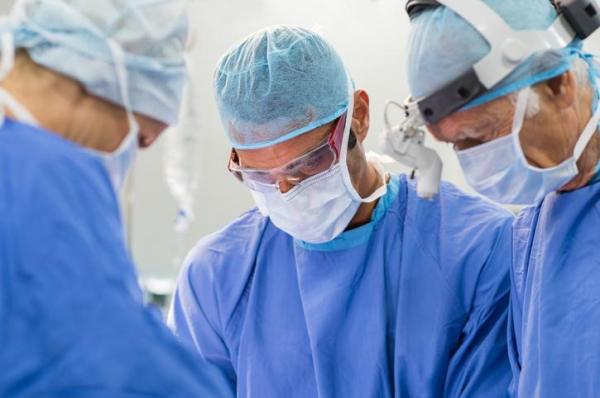
Rectal prolapse is not a common problem in dogs. However, if it does occur, its symptoms need to be recognized. Rectal prolapse in dogs occurs more commonly when a dog is giving birth or straining to defecate and is visible to the naked eye. If your dog is suffering from a rectal prolapse, it’s very important that you take it to the veterinarian as soon as possible to treat this condition accordingly.
For more about the causes, symptoms and treatment of rectal prolapse in dogs, keep reading here at AnimalWised.
Rectal prolapse in dogs
If you observe that your dog’s anus is protruding, it is normal that it may cause alarm and concern. Rectal prolapse in dogs, although not very common, causes a protrusion of anorectal tissue. This means that this tissue will exist the outside of a dog’s body through the anus.
This output is generally produced as a result of considerable effort and/or pressure. This protrusion usually occurs in cases of severe constipation, diarrhea, fecal impaction, anorectal obstruction or obstruction in the bladder. This type of prolapse can also occur during dog pregnancy or childbirth.
There are several types of prolapse, which depend on the tissue that is externalized.These include:
- Mucosal prolapse: mildest type of anal prolapse in dogs and is limited only to the lining of the anal canal.
- Complete prolapse: is more serious, where one can visibly see the prolapse.
For more about anal prolapse in dogs, we recommend reading about dog hemorrhoids, which can occur due to untreated dog tumors in the anal area. In addition, we recommend reading, why is my dog bleeding from its anus?
Rectal prolapse in dogs: symptoms
When it comes to a mucous prolapse in dogs, one will notice an inflamed and reddened doughnut formed ring which will protrude out of the anus. This type of anal prolapse in dogs is often mistaken for dog hemorrhoids.
In cases of a complete anal prolapse in dogs, a red or pinkish cylindrical mass will become exteriorized. This type of dog anal prolapse requires immediate veterinary attention and if not treated accordingly, this exposed tissue can suffer irreversible damage. If you notice this prolapse, we recommend wrapping the external tissue in a dampened gauze until you see a veterinarian, keeping it protected from exterior factors.
For more, we recommend reading our article where we discuss everything you need to know about a dog’s anal glands.

Dog rectal prolapse: treatment
Treatment for anorectal prolapse in dogs will depend on the type of prolapse. Mucosal prolapse in dog treatment will depend on the cause. Most often than not, treatment will include softening the feces so that they are easier to expel. For more, take a look at our soft diet for constipated dogs.
A veterinarian will be the one to treat this condition accordingly. Not only will they be able to prescribe the most appropriate antibiotics (if needed), but they will also be able to offer an adequate easy-to-digest diet for your dog.
Rectal prolapse in dogs: home remedies
It’s important to know that these home remedies will not cure a rectal prolapse, but can help to alleviate the symptoms. Some of these home remedies include:
- Offering your dog a teaspoon of olive oil to aid in the evacuation of feces.
- Making sure your dog drinks enough water.
- Offer your dog homemade or wet food.
These remedies should all, however, only be performed under the supervision of your veterinarian.
A complete prolapse treatment, on the other hand, is more complex and may require surgery. Keep reading for more about a complete rectal prolapse in dogs treatment.
Dog rectal prolapse: surgery
Treatment of rectal prolapse in dogs will depend on the severity of the prolapse. In more severe cases, surgery will be required. In milder cases, one reduced in size, your veterinarian will make a provisional suture forming a bag around the anus.
In the case that the prolapsed tissue has become necrotic (dead) and irrigation is cut off, surgery will become more complex.

This article is purely informative. AnimalWised does not have the authority to prescribe any veterinary treatment or create a diagnosis. We invite you to take your pet to the veterinarian if they are suffering from any condition or pain.
If you want to read similar articles to Rectal Prolapse In Dogs - Symptoms, Causes and Treatment, we recommend you visit our Other health problems category.